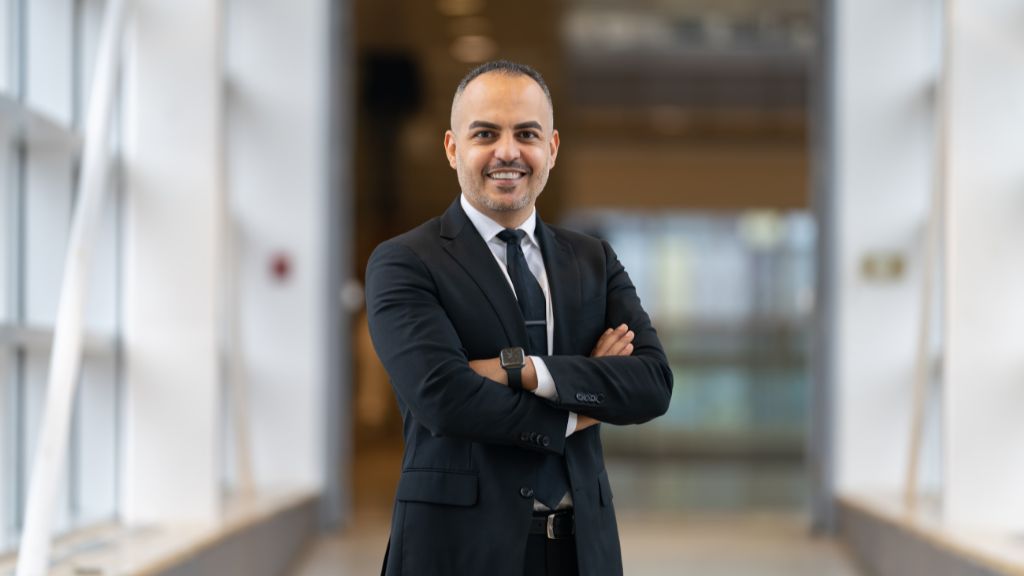Health Policy PhD grad’s journey from valedictorian to federal policy advisor

Firas Khalid is a self-proclaimed lifelong learner. With a medical degree, two master’s degrees, and a graduate certificate, his educational journey was still far from over. In 2019, Khalid graduated from the Health Policy PhD program — one of seven graduate programs offered by the Department of Health Research Methods, Evidence, and Impact (HEI) at McMaster University.
Khalid began his public health career as an 18-year-old with an honest passion to change the world. He worked as an intern at the World Health Organization headquarters in Geneva, Switzerland where he developed interventions aimed at improving maternal health in low-income regions. This experience ignited his passion for addressing health and societal disparities among vulnerable populations, leading him to pursue a medical degree.
During his medical studies, Khalid recognized the critical importance of research methods. “Balancing medical school and research is tough, but it’s essential,” he explains. Khalid graduated with distinction in research, demonstrating his dedication to informed decision-making and motivating him to continue his education.
After earning two master’s degrees and a graduate certificate, Khalid was left with a question that kept him up at night: “How do we, in an emergency, get evidence to decision-makers in real time?” He describes this as part of a necessary approach to improving healthcare outcomes. “Policy and decision-makers don’t have time to read systematic reviews,” he says.
Khalid sought to answer this question by pursuing a PhD. He chose McMaster University, where he worked under the direct supervision of John N. Lavis, HEI professor and Canada Research Chair in Evidence-Informed Health Systems.
“HEI stood out to me because of its interdisciplinary approach and strong emphasis on translating evidence into policy. The department’s commitment to methodological rigor and practical application resonated with my career aspirations,” Khalid says.
During his time at HEI, Khalid found answers to his question through his thesis, which focused on supporting the use of research evidence to inform decision-making in crisis zones. His research not only advanced his understanding of health policy, but also emphasized the importance of bridging the gap between research and immediate policy application.
The network of global experts he had access to during his time at HEI is among the many aspects of the program he considers invaluable. “We have leading experts within arm’s reach,” Khalid says. “Experts in all sorts of research methods — qualitative, quantitative, and mixed methods. McMaster and HEI serve as a vessel for this expertise, and it was their collective knowledge and collaborative spirit that played a crucial role in shaping my approach to public health and policy solutions.”
Khalid was the valedictorian of his graduating class. He recalls the advice he shared with his peers during his speech, words that continue to guide him to this day: “Show up and do the work. Allow yourself to be seen and heard by others. Strive to do your best, even when the experience isn’t what you expected.”
After graduating from McMaster, where Khalid studied and contributed to advancing knowledge on supporting real-time evidence use in time-sensitive contexts, he took the opportunity to put his research into practice. As a CIHR health systems impact fellow at the Canadian Red Cross, Khalid implemented the strategies conceptualized in his PhD thesis. His work focused on supporting real-time evidence use during health and humanitarian crises, addressing critical challenges in high-pressure environments.
Reflecting on this transition from research to application, Khalid shares, “McMaster provided the foundation I needed to expand on the existing literature in evidence-informed decision-making and translate that knowledge into practical applications to support better decision-making in critical situations.”
After completing his fellowship at the Canadian Red Cross, Khalid was recruited by the Federal Government through the prestigious Recruitment of Policy Leaders program, which seeks exceptional individuals with the potential to drive positive change and make significant impacts in the federal public service. He now serves as a senior policy advisor at the Public Health Agency of Canada, Office of the Chief Science Officer, where he has led efforts to establish an external advisory committee on science. In this role, Khalid champions an inclusive, equity-focused approach to science advice.
“At McMaster, I spent years studying the theoretical foundations and using rigorous research methods to develop strategies for supporting real-time evidence use by policymakers. Now, working within the federal government, I’m applying those strategies firsthand among policymakers and decision-makers to strengthen evidence-informed decision-making.”
Khalid has consistently pursued opportunities to learn and take on new experiences, driven by his passion for addressing health and societal disparities among vulnerable populations. Inspired by the encouragement of his mother and late father — who always told him he could achieve anything he set his mind to — Khalid’s journey is a testament to their support.
Community